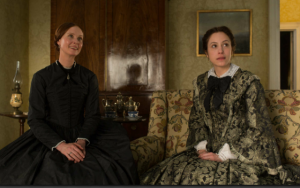A QUIET PASSION: 3 ½ STARS. “one woman’s intimate connection with words.”
“A Quiet Passion” avoids the two major pitfalls of most poetry movies, it neither seeks to ponder the creative process or glamourize the poet’s excesses and rakish behaviour. Instead, this is a modest movie that focuses on Emily Dickenson’s reclusive existence; giving us insight into the personality published just seven poems in her lifetime.
Set in nineteenth century Amherst, Massachusetts, at the start Emma Bell plays Dickenson as an unconventional young woman who leaves her women’s college because she, “will not be forced to piety.” Later “Sex and the City’s” Cynthia Nixon takes over the role as the poet matures into a fiercely opinionated and vivacious woman who lives with her father (Keith Carradine), mother (Joanna Bacon), brother (Duncan Duff) and sister (Jennifer Ehle). Unlike most dour representations of Dickenson, Nixon plays her as an intense, intuitive person bursting at the seams with ideas. Despite the strict morays of the time—she had to ask her father for permission to write—she would stay in that tightly knit family unit her entire life, soaking up the inspiration that fed the nearly 2000 poems she wrote but (mostly) never published. Writing poetry by hurricane lamp, calling it, “my solace for the eternity that surrounds us all,” she pours a life ripe with bereavement and disappointment onto the pages.
There’s not a lot of action in “A Quiet Passion.” It is primarily housebound, as Emily withdraws from the outside world, surrounding herself with those she knows and trusts best. It is, I suppose, a good way to visualize her growing sense of societal alienation but it makes for a film that often feels closed in, claustrophobic.
Luckily there is nothing stodgy about the performances. Nixon leads the cast, breathing life into a character who retreated from the world, expressing her joy and pain in the written word. She makes the mannered dialogue seem natural, bringing an ease to the conversation and societal structures. It’s a lovely performance, one that transcends the film’s archness and artifice.
There is poetry in “A Quiet Passion.” Perhaps not enough of actual poetry for Dickenson purists—it’s mostly heard in voiceover—but a cinematic poetry from director Terence Davies who has visualized one woman’s intimate connection with words.

